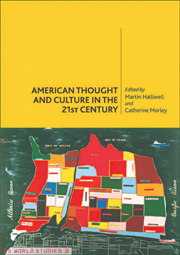Book contents
- Frontmatter
- Contents
- Acknowledgements
- Notes on the Contributors
- Introduction: The Next American Century?
- PART 1 POLITICS
- 1 American Politics in the 1990s and 2000s
- 2 American Leadership into the New Century
- 3 9/11 and US Foreign Policy
- 4 Three Variations on American Liberalism
- 5 The Rise of Postmodern Conservatism
- 6 US Propaganda
- PART 2 SOCIETY
- PART 3 CULTURE
- Bibliography
- Index
6 - US Propaganda
from PART 1 - POLITICS
Published online by Cambridge University Press: 05 August 2013
- Frontmatter
- Contents
- Acknowledgements
- Notes on the Contributors
- Introduction: The Next American Century?
- PART 1 POLITICS
- 1 American Politics in the 1990s and 2000s
- 2 American Leadership into the New Century
- 3 9/11 and US Foreign Policy
- 4 Three Variations on American Liberalism
- 5 The Rise of Postmodern Conservatism
- 6 US Propaganda
- PART 2 SOCIETY
- PART 3 CULTURE
- Bibliography
- Index
Summary
In September 1992, a relatively obscure international treaty took effect in the United States. Originally signed by Democratic President Jimmy Carter in 1977, the International Covenant on Civil and Political Rights (ICCPR) ultimately oversaw passage by Carter's Republican successor once removed, President George H. W. Bush, after a two-thirds Senate vote. Article 20 of the ICCPR reads: ‘1. Any propaganda for war shall be prohibited by law. 2. Any advocacy of national, racial or religious hatred that constitutes incitement to discrimination, hostility or violence shall be prohibited by law’.
The covenant makes no attempt to legally define propaganda. It was signed into law in the US within the context of a country that had just one year earlier successfully defeated Iraq using methods of mass persuasion that were then unparalleled since the Cold War. Saddam Hussein was referred to as the Hitler of the Middle East from the President's lips down to the newsrooms of the mainstream media and every manner of commercial product was created with his tyrannical visage: from T-shirts to golf balls to urinal mats making him the object of ire for democracy-loving Americans. Even if average Americans could not locate Iraq on a map, they certainly knew that this Hussein guy was another bad ‘H’ who mandated ultimate humiliation and defeat. Following the swift and overwhelming US-led coalition victory in pushing Iraq out of Kuwait, General Colin Powell responded to a question about the number of Iraqi dead from ground troops or air sorties: ‘It's really not a number I'm terribly interested in’.
- Type
- Chapter
- Information
- American Thought and Culture in the 21st Century , pp. 97 - 112Publisher: Edinburgh University PressPrint publication year: 2008

